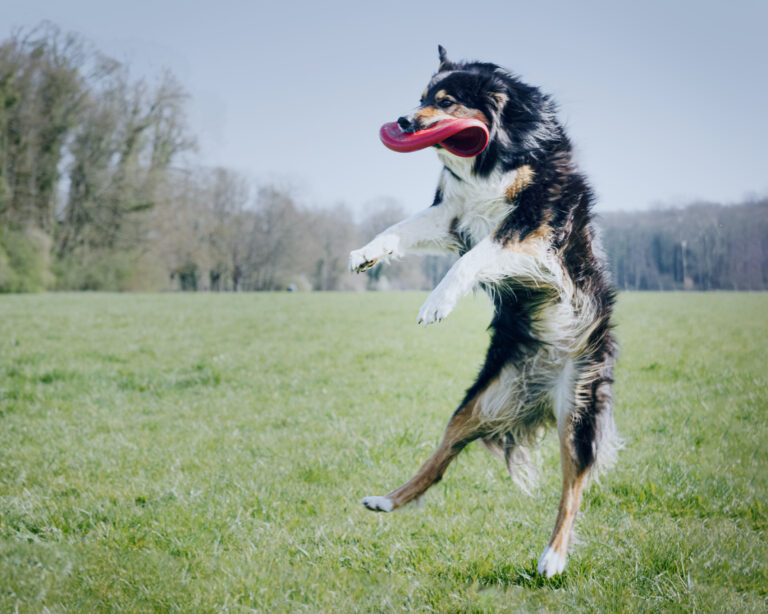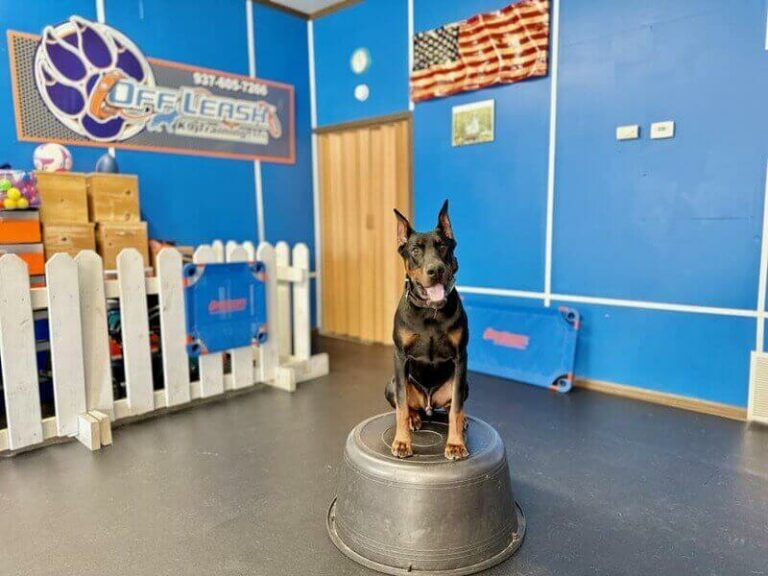A Guide to a Well-Behaved and Happy Pup
Choosing the Perfect Puppy Training Program:A Guide to a Well-Behaved and Happy Pup
Choosing the Right Puppy Training Program for Your Dog: Learn about the importance of puppy training, different types of training programs, how to evaluate professional trainers, the benefits of online training courses, factors to consider when choosing a program, tailoring training to specific needs, reinforcing training at home, and find a reputable training program at Dayton Off Leash K9 Dog Training.

Importance of Puppy Training
Proper training is crucial for a dog’s socialization, behavior, and overall well-being. It fosters a strong bond between the owner and the dog, creating a harmonious living environment. Effective training helps in shaping a well-mannered and obedient pet, contributing to a pleasant and enjoyable companionship. For example, a well-trained puppy is more likely to respond positively to commands and exhibit appropriate behavior in various situations, making interactions with the family and other pets more enjoyable and stress-free.
Additionally, puppy training plays a significant role in ensuring the safety of the puppy and those around them. Through training, puppies learn to understand boundaries, develop self-control, and respond appropriately to various stimuli, reducing the risk of accidents or conflicts. Moreover, training provides mental stimulation for the puppy, preventing boredom and the development of destructive behaviors. By engaging in training activities, puppies use their minds, learn new skills, and build confidence, contributing to their overall well-being and happiness. This mental stimulation is essential for the healthy development of a puppy, promoting cognitive function and reducing the likelihood of anxiety-related issues in the future.
In essence, puppy training is not only about teaching basic commands but also about instilling a sense of security, confidence, and understanding in the puppy. It sets the foundation for a positive and fulfilling relationship between the owner and the dog, establishing clear communication and mutual respect. Therefore, investing in a comprehensive puppy training program is a vital step in ensuring the long-term well-being and happiness of the puppy and the entire family.
Understanding Different Types of Puppy Training Programs
When choosing a puppy training program, it’s important to understand the different types available. Obedience and socialization classes are crucial for teaching basic skills and promoting positive behavior in puppies. These classes focus on essential commands, leash training, and proper socialization, which are vital for a well-behaved and well-adjusted dog. Puppy training classes are important for socialization and teaching basic skills.
In addition to general classes, specialized courses are available to cater to specific needs such as addressing puppy behavior problems, basic manners, and training for adolescent dogs. For example, specialized classes can help address issues like excessive barking, chewing, or separation anxiety, providing targeted training to address these behaviors effectively.
The timing of puppy training is also crucial, typically starting around 8 weeks old. This early stage is pivotal for instilling fundamental behaviors and habits in puppies. For instance, enrolling a puppy in obedience classes provides structured learning opportunities, helping them understand commands and proper social behavior from an early age. In addition, early training can prevent the development of undesirable behaviors, setting the foundation for a well-mannered and obedient adult dog.
By understanding the different types of puppy training programs available, owners can make informed decisions about the most suitable training approach for their puppies, ensuring a positive and effective learning experience.
Evaluating Professional Trainers
When choosing a professional trainer for your puppy’s training, it’s essential to consider various factors that can impact the effectiveness of the program. One key factor is the trainer’s experience and qualifications. Look for individuals with relevant certifications and a proven track record in handling and training puppies. For example, a trainer with certifications from reputable organizations such as the American Kennel Club or the Certification Council for Professional Dog Trainers can instill confidence in their expertise.
Additionally, observing the trainer’s style and methods before enrolling can provide valuable insights into their approach and the overall class environment. For instance, attending a training session without your puppy allows you to assess the trainer’s demeanor, training techniques, and the interactions with other dogs and owners. This firsthand observation can help you gauge whether the training methods align with your preferences and your puppy’s temperament.

Furthermore, a strong, positive connection between the trainer and the puppy is vital for effective training and learning. A trainer who exhibits patience, empathy, and a genuine interest in the well-being of the puppies can create a nurturing and supportive learning environment, which is crucial for your puppy’s development and socialization.
In summary, when evaluating professional trainers, consider their credentials, observe their training style, and prioritize a positive and supportive connection between the trainer and your puppy. These factors can significantly influence the success of your puppy’s training program and the overall learning experience.
Benefits of Online Puppy Training Courses
When considering the benefits of online puppy training courses, it’s important to recognize the flexibility they offer. Unlike traditional in-person classes, online courses allow owners to learn at their own pace and convenience. This self-paced nature accommodates different learning styles and schedules, providing an accessible avenue for training. For example, busy professionals may find it challenging to attend regular classes, but online courses offer the flexibility to fit training sessions into their hectic schedules, ensuring that the puppy’s learning is not compromised.
Moreover, online training can strengthen the bond between the owner and the puppy. Through direct interaction and guidance, owners can develop a deeper understanding of their puppy’s behavior and needs, fostering a strong relationship built on trust and communication. This is especially beneficial for owners who may not have easy access to in-person training facilities or professional trainers, as they can still receive valuable guidance and support through online platforms, enhancing the overall training experience for both the owner and the puppy.
Factors to Consider When Choosing a Puppy Training Program
When choosing a puppy training program, there are several key factors to consider in order to ensure that the training is effective and beneficial for your puppy’s development. Word-of-mouth recommendations play a significant role in guiding owners towards reputable puppy training classes. Seeking advice from friends, family, or local pet communities can provide valuable insights into the quality and success of different training programs.
The class environment, training methods, and class size are also crucial considerations. A calm and well-organized class, positive training methods, and small class sizes contribute to a conducive learning environment for puppies. Owners should observe a class without their dog to assess the trainer’s methods and the overall atmosphere of the training sessions. This allows them to gauge whether the training program aligns with their expectations and their puppy’s learning style.
Furthermore, the experience, qualifications, and responsiveness of the trainer are pivotal in ensuring the effectiveness of the training program. A knowledgeable and responsive trainer can adapt to the specific needs of each puppy, providing tailored guidance and support. By thoroughly evaluating these factors, owners can make an informed decision when selecting the most suitable training program for their puppy’s needs, ultimately setting them on the path to a well-behaved and well-adjusted canine companion.
Tailoring Training Programs to Specific Needs
When it comes to addressing the specific needs of puppies, customizable, one-on-one training sessions are incredibly beneficial. These sessions provide an opportunity to address individual behavior challenges that puppies may encounter, such as excessive barking, leash pulling, or separation anxiety. For example, a puppy that exhibits signs of fear or anxiety in group settings may benefit greatly from personalized attention in a one-on-one session, allowing the trainer to focus on building the puppy’s confidence and trust.
Moreover, the adaptability of training programs to meet the unique requirements of both the puppy and the owner ensures a tailored learning experience. For instance, a family with young children may have different training needs compared to a single individual, and a personalized approach can accommodate these specific circumstances. Additionally, ongoing learning and training play a pivotal role in establishing a lasting and positive relationship with the puppy, fostering a strong bond built on trust and effective communication. This personalized approach not only addresses behavioral challenges but also strengthens the connection between the owner and the puppy, enhancing the overall training experience and creating a harmonious living environment.
In light of these considerations, it’s evident that tailoring training programs to specific needs is essential for addressing the diverse requirements of puppies and their owners, ultimately contributing to the well-being and development of the puppy. By choosing a training program that offers personalized attention and adapts to individual needs, owners can ensure that their puppies receive the targeted support necessary for a successful training journey.

Reinforcing Training at Home
Consistent reinforcement of training at home is crucial for the puppy’s learning and behavior. It provides an opportunity for owners to continue the lessons taught in professional training programs by applying them in a familiar setting. For example, if the puppy has learned to sit and stay during training classes, reinforcing these commands at home helps solidify the learning process and ensures that the puppy retains the skills learned in a different environment.
Creating a consistent routine and using positive reinforcement techniques at home supports the training received in professional programs or online courses, contributing to the puppy’s overall development and strengthening the bond between the owner and the dog. For instance, incorporating short, daily training sessions into the puppy’s routine helps maintain their progress and prevents regression in their behavior. This consistent practice reinforces the puppy’s understanding of commands and expectations, leading to better obedience and a more harmonious living environment for both the puppy and the owner.
Reinforcement at home establishes a familiar and supportive environment for the puppy, reinforcing the lessons learned during training sessions. For instance, practicing recall in the backyard or reinforcing loose-leash walking during neighborhood walks provides the puppy with real-life scenarios to apply their training. This real-world application of skills helps the puppy generalize their training, making them more responsive in various situations and settings. Ultimately, reinforcing training at home ensures that the puppy’s learning is integrated into their everyday life, setting the foundation for a well-behaved and adaptable companion.

Call to Action
When it comes to choosing the right puppy training program for your furry friend, it’s essential to explore professional puppy training programs and online courses. These avenues provide invaluable resources and guidance for your dog’s development, ensuring they grow into well-mannered and obedient companions. By enrolling in a reputable training program, you’re not only investing in your dog’s future behavior but also in fostering a strong and lasting bond with your pet.
To take the first step in providing your puppy with the best training, consider visiting the website of Dayton Off Leash K9 Dog Training at https://daytonohiooffleashdogtrainers.com/. Dayton Off Leash K9 Dog Training is a highly respected dog training company with a wealth of experience in providing effective and safe training methods. Their approach is centered around creating a 100% obedient, off-leash, and distraction-proof dog. Whether you’re looking for private lessons, dog behavior consultations, or training packages for dogs of all ages, their comprehensive programs cater to a wide range of needs. By exploring their website, you can gain more insights into their proven training methods and the remarkable results they have achieved for numerous satisfied clients.
This is a valuable opportunity to take proactive steps in ensuring your puppy’s well-being and development. By accessing the website, you can access a free phone consultation and learn more about the training programs available, setting your puppy on the path to a well-rounded and obedient companion.








